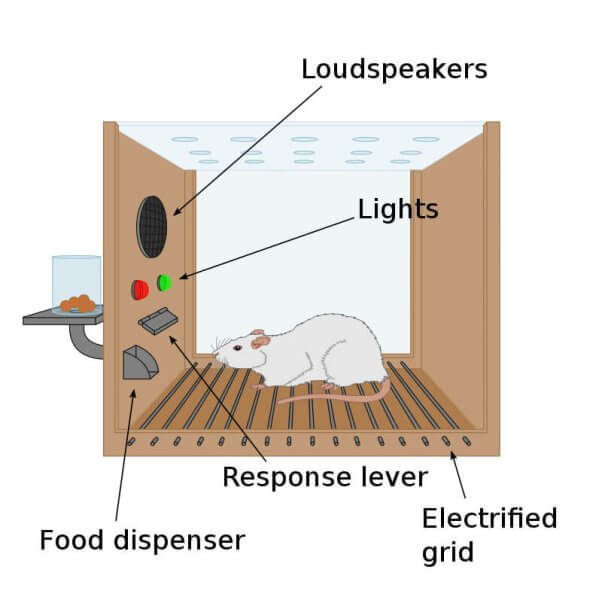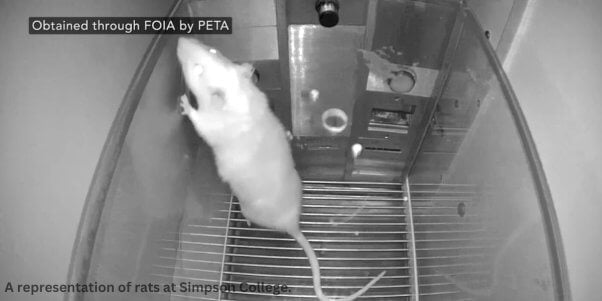Help Us Stop Simpson College From Using Rats in an Undergrad Psych Class
Simpson College, an Iowa school that claims to have “a moral responsibility to respond to ethical challenges” as a core value, cruelly experiments on live rats in one of its psychology courses, despite the availability of effective, non-animal methods. We need your help to convince it to respond to the ethical challenge of animal testing by switching to non-animal teaching methods for this course.

This is an illustration of a Skinner box, a device used in Simpson College’s undergraduate Learning and Behavior course in which rats who’ve been trained to push a lever inside it to receive a drop of flavored water are imprisoned. At the course’s end, any rats who haven’t been adopted are killed.
The class that uses live rats is the undergraduate “Learning and Behavior” psychology course. In it, students attempt to train the animals to push a lever in order to receive a drop of flavored water, and after the course ends, the rats who don’t get adopted are killed.
“None of us really like talking about that too much,” Don Evans, Simpson’s chair of psychology, has publicly said.
We bet you don’t. The reality of killing vulnerable, sentient beings is a bitter pill to swallow.
Rats are highly social individuals who become emotionally attached to each other and form bonds with their human guardians. When playfully tickled, they make chirping sounds strikingly similar to laughter. Rats also express empathy when other rats are in distress and will put themselves in harm’s way rather than allowing someone else to suffer.

Fortunately, there’s a simple way to end the killing: Choose from among the many non-animal teaching methods that are available and already in use in many colleges nationwide, such as these:
- Sniffy the Virtual Rat
This engaging interactive software provides students with a virtual laboratory where they can conduct experiments that demonstrate most of the major conditioning phenomena discussed in textbooks. It’s been tested at several colleges and universities for use in learning and animal-behavior courses. - CyberRat: Operant Laboratory Simulations Program
This program features a fully interactive video of a real animal in a laboratory and a database containing more than 1,600 behavioral video clips, all seamlessly played in unique sequences. CyberRat “serves as a functional supplement and/or total replacement for various live animal laboratory exercises using rats.” - The Learning Simulator
This is an open-source software program that simulates learning in humans and other animals. It’s used in the master’s program in ethology at Stockholm University, the veterinary program at the Swedish University of Agricultural Sciences, and the psychology department at Brooklyn College.
Other, non-computer–based methods are also effective. In one study, students who studied wild pigeons in a city park received evaluation scores equal to those of students who studied psychological principles using rats in a lab. Other studies have found that humanely working with animals in an animal shelter is an effective way to teach psychological concepts like operant conditioning (e.g., using rewards to modify behavior).
Since most psychology experiments using animals are designed to model human behavior anyway, allowing students to learn basic psychological principles with virtual software and then apply them to studies involving human volunteers is also a solid option.
Employing educational tools like these creates an inclusive, engaging, and safe learning environment for all students, including those uncomfortable with animal experimentation. Studies show that up to 60% of psychology students oppose the use of animals in psychology education. And a growing majority of college-age adults are now opposed to all experiments on animals.
Using rats in undergraduate psychology courses is as pointless as it is cruel, and that’s apparent in the department chair’s hesitancy to even talk about the repercussions of this archaic practice. There’s a reason he doesn’t want to talk about it: It’s just plain wrong.
We’ve written to the school, urging it to adopt compassionate, non-animal teaching methods in this class. Its response was pathetic:
“We get these [kinds of requests to use non-animal teaching methods] as do other institutions from time to time. Our policy is to not respond.”
—Marsha Kelliher, then president of Simpson College (September 19, 2022)
So now we need your help.
Please TAKE ACTION today by sending a polite letter to the president of Simpson College urging him to adopt compassionate, non-animal teaching methods in his school’s “Learning and Behavior” psychology course (PSYC 331).
Jay Byers, J.D.
President
Simpson College
[email protected]
Please feel free to use our sample letter, but remember that using your own words is always more effective.

